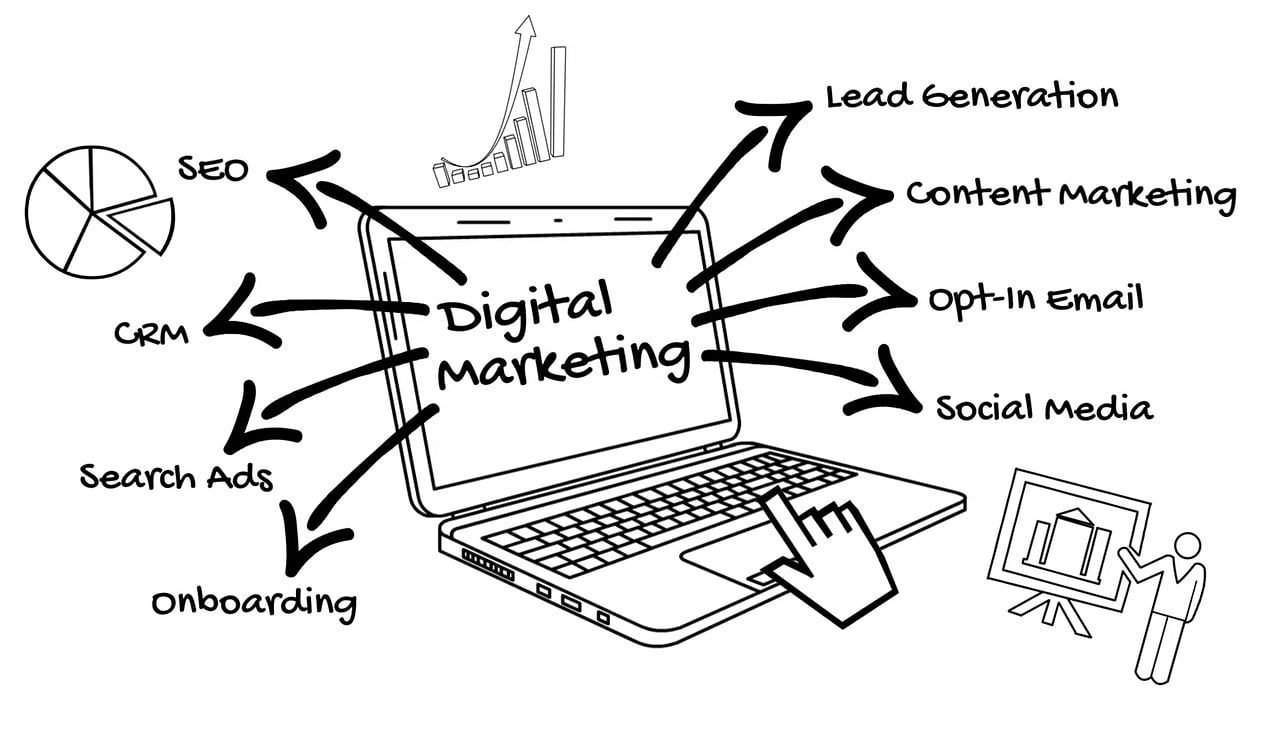The Future of Advertising: How Digital Marketing is Transforming Businesses

The Future of Advertising: How Digital Marketing is Transforming Businesses
In a world where our screens are an extension of ourselves, the landscape of advertising is undergoing a seismic shift. Gone are the days when businesses relied solely on billboards and brochures to reach their audience. Today, digital marketing isn't just an option—it's the lifeline for brands striving to make their mark in an ever-evolving marketplace. As we stand on the brink of this new era, it's clear that innovation is not only redefining how we communicate but also revolutionizing consumer behavior and business strategies alike. Join us as we explore the dynamic future of advertising and uncover how digital marketing is transforming businesses from mere players into industry pioneers!
The Rise of Digital Marketing: How it has changed the game for businesses
The rise of digital marketing has revolutionized how businesses connect with their audiences. Traditional advertisements, such as billboards and print ads, often felt like throwing darts in the dark. Today, brands can reach targeted demographics with precision.
With social media platforms and search engines at their disposal, companies have access to real-time analytics. They can assess what works and pivot strategies quickly based on data insights.
Moreover, digital marketing levels the playing field. Small startups now compete alongside established giants without needing deep pockets for massive ad buys. Creative content becomes king rather than sheer budget size.
As consumers increasingly turn to online channels for information and shopping, businesses must adapt or risk falling behind. Engaging campaigns that resonate emotionally are more vital than ever in this fast-paced landscape where attention spans dwindle rapidly.
Understanding Digital Marketing: Key concepts and strategies
Digital marketing encompasses a vast array of strategies that cater to diverse business needs. At its core, it leverages the internet and digital technologies to reach audiences effectively.
Search Engine Optimization (SEO) is one of the main pillars. By optimizing content for search engines, businesses can improve visibility. This drives organic traffic and enhances brand awareness.
Content marketing plays a crucial role as well. Quality content informs, engages, and builds trust with potential customers. It positions brands as industry leaders while addressing audience pain points.
Social media marketing offers direct interaction with consumers. Platforms like Instagram and Facebook allow businesses to create targeted campaigns that resonate emotionally with users.
Email marketing remains an essential tactic too. Personalized messages nurture leads and maintain customer relationships over time.
Understanding these key concepts equips businesses to craft tailored strategies for success in today's competitive landscape.
Benefits of Digital Marketing for Businesses: Cost-effective, targeted, measurable results
Digital marketing offers businesses a cost-effective alternative to traditional advertising. With lower entry costs, even small companies can compete in the marketplace.
Targeting is another significant advantage. Businesses can reach specific audiences based on interests, behaviors, and demographics. This precision ensures that marketing efforts resonate with potential customers.
Measurable results set digital marketing apart from its predecessors. Advanced analytics provide insights into campaign performance in real-time. Companies can track clicks, conversions, and engagement levels effortlessly.
This data allows for immediate adjustments to strategies when needed. Resources are allocated more efficiently as businesses learn what works best through ongoing analysis.
Moreover, ROI becomes clearer with digital channels like social media or email campaigns where every dollar spent can be evaluated against tangible outcomes. The agility of this approach empowers brands to make informed decisions swiftly, maximizing their impact in an ever-changing market landscape.
Challenges and Limitations: Addressing issues such as privacy concerns and algorithm changes
Digital marketing is not without its hurdles. One of the most pressing challenges today revolves around privacy concerns. With consumers becoming increasingly aware of how their data is used, trust has become a precious commodity. Businesses need to navigate this delicate landscape carefully.
Algorithm changes also pose significant obstacles for digital marketers. Platforms like Google and Facebook frequently update their algorithms, which can drastically affect a brand's visibility and reach. Staying ahead requires constant adaptation and an agile strategy.
Moreover, small businesses often struggle to compete with larger brands that have more resources at their disposal for digital advertising efforts. This disparity can make it hard for smaller players to gain traction in crowded markets.
As the digital landscape evolves, understanding these challenges becomes essential for effective marketing strategies going forward.
The Future of Advertising: Predictions for how digital marketing will continue to evolve
As technology advances, digital marketing is poised for significant transformation. AI and machine learning will play pivotal roles in personalizing customer experiences. Expect more tailored content, dynamically adjusted based on user behavior.
Voice search optimization will gain traction as smart speakers become household staples. Brands must adapt their SEO strategies to capture this emerging trend effectively.
Additionally, the rise of augmented reality (AR) will redefine how consumers interact with products online. Imagine trying on clothes or visualizing furniture in your home before making a purchase.
Privacy regulations are also set to evolve. Marketers need to navigate these changes while maintaining trust with their audiences through transparent practices.
Finally, video content isn’t going anywhere; it’s likely to grow even more dominant across platforms. Short-form videos will continue capturing attention quickly and effectively, driving engagement like never before.
Tips for Businesses to Stay Ahead in the Digital Marketing Game
Embrace change and adaptability. The digital landscape evolves rapidly, so staying flexible is crucial. Regularly update your strategies based on the latest trends.
Invest in continuous learning. Attend workshops, webinars, or online courses to keep your team informed about new tools and techniques in digital marketing services.
Leverage data analytics for insights. Use metrics to track performance and understand customer behavior better. This helps refine campaigns effectively.
Personalization can set you apart from competitors. Tailor content for specific audiences to enhance engagement and build loyalty.
Collaborate with a trusted digital marketing company if you lack expertise in-house. They bring valuable experience that can elevate your brand’s presence online.
Lastly, foster a strong community around your brand through social media engagement. Listening to feedback builds trust and encourages brand advocates who spread the word organically.
Conclusion: Emphasizing the importance of embracing digital marketing for future success
The landscape of advertising is rapidly changing. Businesses that cling to traditional methods risk falling behind in a world where digital marketing reigns supreme. Embracing digital marketing isn’t just an option; it’s a necessity for companies seeking sustainable growth and relevance.
Today, customers are more connected than ever before. They expect personalized experiences tailored to their preferences. Digital marketing offers tools and strategies that allow businesses to engage with their audience on a deeper level.
From social media outreach to search engine optimization, the avenues available for reaching potential customers are vast and varied. Companies leveraging these channels can build brand loyalty while enhancing visibility in saturated markets.
As technology continues to evolve, so too will the strategies employed by successful businesses. The future belongs to those who adapt—those who understand that digital marketing services are not merely supplementary but foundational in shaping how they connect with consumers.
Organizations must prioritize building robust online presences if they wish to thrive amid constant change and competition within their industries.

